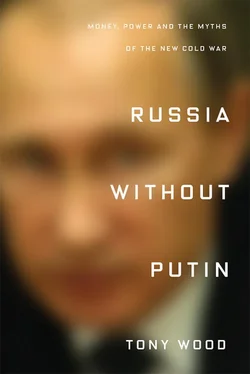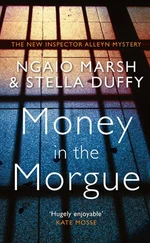In Russia, the widening of the rift with the West was accompanied by a mounting interest in ideas that might allow the country to define a role for itself outside, or even in opposition to, the Western liberal order. The 2000s had already brought increasingly frequent assertions of Russian national pride, a resurgent patriotism that fed off the country’s oil-fuelled return to a measure of economic prosperity. In the 2010s, such sentiments became more widespread and more strident, intensifying drastically after the Ukraine crisis. Politically, the new Russian nationalism was predominantly conservative, if not reactionary. Some variants of it harked back to Soviet-era glories, while others evoked a more distant imperial past. These nostalgias were far from identical in tone and content – there are, after all, differences between remembering victory over fascism and sighing over the good old days of feudalism – but they shared a compensatory impulse, finding some kind of redress for Russia’s relatively reduced status in restorationist fantasies about the past. Yet another strand of nationalism looked to the European fascist and far-right tradition, seeking to impose a contradictory dream of ethno-racial purity on Russia’s multi-ethnic territory. Each of these tendencies gained a certain amount of currency in the 2000s, without any of them becoming dominant ideologically – though some of the far-right’s adherents certainly caused plenty of harm, carrying out dozens of vicious attacks on migrants and foreigners. [14] Russian nationalists were also almost certainly behind the 2009 killing in Moscow of lawyer Stanislav Markelov and journalist Anastasia Baburova, both antifascist activists. Markelov had argued against the early release of Colonel Yuri Budanov, who had been jailed in 2003 for torturing and killing a young Chechen woman; Budanov, who had become an icon for Russian nationalists, was himself shot and killed in 2011.
{2} 2 The Moscow-based SOVA Centre keeps track of such attacks, and issues regular reports on the state of the far right in Russia; see www.sova-center.ru .
At the same time, the new century brought a revival of interest in a set of ideas that was avowedly supranational, and yet also profoundly nationalistic. ‘Eurasianism’ – the notion that Eurasia is home to a civilization distinct from its European, Asian or North American counterparts, with Russia at its core – has a long pedigree, dating back to the nineteenth century. {3} 3 The literature on Eurasianism is extensive and growing; for an incisive overview, see Marlène Laruelle, Russian Eurasianism: An Ideology of Empire , Washington, DC and Baltimore 2008.
But it emerged in its most developed form in the 1920s among a group of Russian émigré intellectuals who, having fled the revolutionary turmoil of 1917, came to see the USSR as the heir to the tradition of Great Russian statehood, rather than as its destroyer. The Soviet Union was simply the new name for a space in which a distinctive fusion of European and Asiatic peoples and cultures would flourish. The Eurasianists included figures such as the linguists Nikolai Trubetskoi and Roman Jakobson, the geographer Pyotr Savitsky, the literary critic D. S. Mirsky, the historian George Vernadsky and others. Overall, they could be described as radical conservatives: they rejected the White exiles’ nostalgia for the tsarist system, and were opposed to the crude ethnic chauvinism of the pan-Slavists.
Many of Eurasianism’s original advocates, having reconciled themselves to the new regime and returned, perished at its hands in the 1930s. Thereafter the flame was kept alive as the preoccupation of a dissident fringe. Its leading proponent was the ethno-historian Lev Gumilev, son of the poets Nikolai Gumilev and Anna Akhmatova. {4} 4 For a systematic portrait of Gumilev’s ideas, and the context in which they developed, see Mark Bassin, The Gumilev Mystique : Biopolitics, Eurasianism, and the Construction of Community in Modern Russia , Ithaca, NY 2016.
His extensive writings gave Eurasianism a new, biological twist: Eurasia was not so much a spatial as an ethno-racial entity, in which several distinct ethnoi lived harmoniously under the rule of a Russian superethnos . The latter was fated to clash, however, with the cosmopolitan universalism of the West. Gumilev’s ideas gave a pseudo-scientific veneer to a Soviet counter-cultural version of race-thinking, repackaging crude prejudices as high-minded doctrine by wrapping them in nebulous terminology of his own devising. Many were drawn to his work because it seemed to square the circle of national and ethnic questions in the USSR: there were supposedly enduring, essential differences between the peoples of the former Russian empire, and yet there was a paradoxical unity in their separateness – and that unity was apparently the benign side effect of Russian dominance. The USSR was simply the latest form taken by a biologically determined destiny.
Amid the disorientations of perestroika and especially during the 1990s, Gumilev’s ideas gained a huge audience. They seemed to offer a non-Communist justification for Russia’s continued sway over its periphery, implicitly allowing readers to see the loss of empire as a temporary bump on a path foreordained as much by genetics as by geopolitics. Long after Gumilev’s death in 1992, his books continued to be issued in enormous print-runs. By some measures, he could be classed as the most influential intellectual of the post-Soviet era, implanting in several million readers a set of deterministic, essentialist ideas about ethnicity and history.
Yet the version of Eurasianism that has come increasingly to the fore in the twenty-first century is a slightly different complex of ideas. Often dubbed ‘neo-Eurasianism’, it shares some features with its predecessors: like the original Eurasianists, its adherents focus on Eurasia as a unit, seeing it as fundamentally opposed to the West along a number of axes; they also share Gumilev’s belief in the distinctive, essentialized characteristics of ethno-national groups. But unlike its precursors, neo-Eurasianism is concerned above all with the contemporary struggle against Western-led globalization, which is imposing a homogenizing liberal cosmopolitanism on the world. Indeed, in terms of its real intellectual lineage this new strand of thinking ironically owes less to Russians than it does to Western reactionary thinkers of the twentieth century: interwar theorists of geopolitics such as Carl Schmitt, figures from the French New Right such as Alain de Benoist, and pundits like Samuel Huntington, with his idea that the new century would be shaped by a ‘clash of civilizations’.
Neo-Eurasianism’s most energetic promoter has been Aleksandr Dugin, who became perhaps the emblematic Russian public intellectual of the 2010s: part media-friendly expert on geopolitics, part bearded Dostoevskian mystagogue. {5} 5 For portraits of Dugin, see Laruelle, Russian Eurasianism , ch. 4; Andreas Umland, ‘Aleksandr Dugin’s transformation from a lunatic fringe figure into a mainstream political publicist, 1980–1998’, Journal of Eurasian Studies , vol. 1, no. 2, 2010; on Dugin and Russia’s new right more generally, see Charles Clover, Black Wind, White Snow: The Rise of Russia’s New Nationalism , London 2016.
His career is in its own way a chronicle of Russian nationalism’s development. The son of a military intelligence officer, Dugin was closely involved in the birth of the Russian far right in the 1980s and early 1990s, including the anti-Semitic organization ‘Pamyat’ (Memory) and the National Bolshevik Party. At the same time, he produced assorted ramblings on esoteric philosophy, in which he paid tribute to the Nazis’ obsession with the occult. Up to the mid-1990s, few besides cranks were interested in these ideas. But the deep unpopularity of Yeltsin’s liberal reforms, and the continuing humiliation of Russia’s loss of status on the world stage, opened a way into the mainstream for nationalist themes. Dugin, too, worked his way into the corridors of power, becoming adviser to Duma speaker Gennady Seleznev and writing a primer on the Foundations of Geopolitics (1997) that was well received by the Russian military.
Читать дальше












